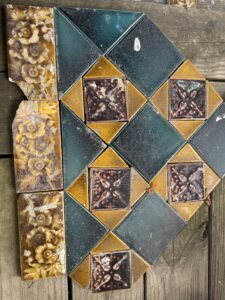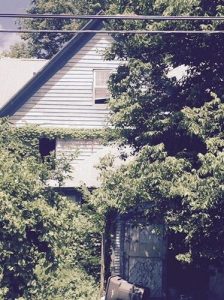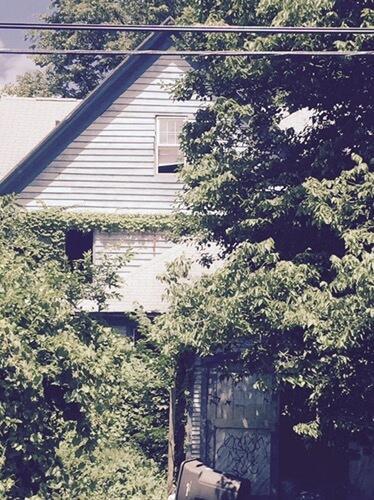I came home and found her sweeping my stoop, hoping to get some money from me, her rumpled unwashed clothes bagging around her. I paid her extra because it was already hot, and the sweat was tracking down her gaunt face. We talked on my porch for nearly half an hour, the Diet Coke I had poured her warming in the glass. I heard things I wished I would not have heard, about things that should never happen. To anyone.
She started smoking at age seven, the same year her father began to sexually abuse her.
How’s that for a start on life?
“We don’t have furniture,” she said, “so I sleep on the floor with a blanket. There are bed bugs in that place you know.”
She told me a few additional things about her relationship with her current boyfriend that I wish I could vomit out of my memory.
When I was a teenager I devoured volume after volume of Dickens’ novels about the plight of humanity in London some decades back. I would wrap myself in a blanket on a cold winter night during Christmas vacation in the living room where other members of my family would be reading as well, or perhaps entertaining a chess match with a sibling. Dad would be invisible behind a newspaper on the recliner until the newspaper slid lower and lower and he fell asleep. The frost would creep over the metal parts of the front door, even on the inside. Mom would make witty observations from her chair, and I would read the strange tales of smoky blacksmiths, prison cells, wedding cake covered with spiders, streets that ran with blood, and criminals who earned a living by robbing dead bodies or snatching purses. There were small hungry children and pompous officials and usually one or two soft-hearted, sensitive heroes and heroines.
To be buried alive for 19 years!
OR
The discreet Mr. Lorry said, in a sample tone of the voice he would recommend under the circumstances, “How do you do, Mr. Stryver?”
OR
All done, all gone! So much was done and gone. What a doleful night! How anxious, how dismal, how long! The closet whispered, the fireplace sighed…
Occasionally, when overcome by his wit, I would subject my family to hearing me read a portion aloud. Of course, they never appreciated it as much as I did, not having the context, but I couldn’t resist.
But this week, I read Dickens and realized that I had changed.
I was studying twenty centuries of literature, art, and philosophy for a class for my bachelor’s degree in nursing. I read about Plato and his thoughts and Michelangelo and his paint brush and Isaac Newton and his science and Mozart and his piano. When I got to the end of the 1800’s, there was an excerpt from Dickens’ book Bleak House:
Jo lives—that is to say, Jo has not yet died—in…a black, dilapidated street, avoided by all decent people, where the crazy houses were seized upon, when their decay was far advanced, by some bold vagrants who after establishing their own possession took to letting them out in lodgings.
That was where I came up for air. It sounded exactly like my street, right down to the stories of pathetic landlords. Even the title of the book, Bleak House, would be a fitting title to tack to the house across the alley from me.
Now, these tumbling tenements contain, by night, a swarm of misery. As on the ruined human wretch vermin parasites appear, so these ruined shelters have bred a crowd of foul existence that crawls in and out of gaps in walls and boards; and coils itself to sleep, in maggot numbers, where the rain drips in; and comes and goes, fetching and carrying fever and sowing more evil in its every footprint than Lord Coodle, and Sir Thomas Doodle, and the Duke of Foodle, and all the fine gentlemen in office, down to Zoodle, shall set right in five hundred years.
Even though Dickens brought to light the victims, notice he did not excuse them. He says they sowed evil with every footprint. Nor did he suggest there was anything the politicians could do, although it’s clear he’s mocking them.
What a skill, by the way, to call politicians Coodle, Doodle, Foodle and Zoodle, so avoiding real names! And how I hate the word maggot, with all the images it brings to mind.
I was just about through the Realist Period when my front door bell rang, the one with the Handel ring tone (at least I think it’s Handel. I can’t find my manual).
It was my neighbor.
“Can I pull your weeds?” She asked.
“I can’t afford to hire you every day,” I said. By her own admission her cigarette habit is expensive. “I’m studying. But I’ll let you know if there’s something more.”
I went back and finished my studies. A little later my Mozart door bell rang. The back door.
I saw blond hair on a short-ish person, which I recognized as the hair of my neighbor, a girl about 12 years old, so I opened the door.
She’s beautiful.
“When are you having your next ice cream party?” She asked.
Behind her, the chain link fence, wooden light pole and leafy trees were dark and wet in the turbulence of storm. It was hard to tell if the storm was done, or if another was coming.
We chatted and she explained that she and her friends had been throwing sand at each other and she had gotten tired of it.
Her lavender shirt with a neck ruffle was smudged with dirt and I could smell an odor even though we weren’t close.
“I hope it’s not in my hair,” she said.
“Sand is hard to get out of hair,” I said. “I remember that from when I got sand in my hair.”
“And lice,” she said. “I usually comb them out like this,” she said, reaching her arms above her head to demonstrate.
Still later, I went walking with a friend. It was almost cool for a July evening and we didn’t want to be out too late due to some potential threats of violence that night.
She had brought a paper cup of coffee from my house (did I actually cook? Yes! Vegetables too!) and threw it in someone’s lidded garbage barrel, which I assured her was common practice. The barrel reminded her of a house she visits in our town.
“I opened the lid one time and it was full of maggots in there,” she said.
That word again!
Not to mention that the streets of our nation’s other cities have been pretty slick with blood lately. The only thing we’re missing is wedding cake with spiders, and we have plenty of spiders.
If the Zoodles, Coodles, and Foodles, politicians of Dickens’ day, could not remedy the stinking tenements of London, odds are that the Trudles and Cloodles of our day won’t remedy ours.
Perhaps, in any age, it comes down, not to policy, but to one single person unwilling to let someone go, unwilling to relinquish hope.
I may wish to be the girl in the arm chair on the gravel road drinking tea in a winter storm. But I no longer have that leisure. My life experiences have even changed the way I read the words of my favorite author. And I am reminded that there are people all around me who need, more than anything else, someone to hope for them, to not get cynical.
Like my friend who keeps going despite the maggots. If everyone would have a friend like her, I am certain this world would be a different place.






6 thoughts on “Bleak House”
Not to worry, dear friend!!! I, too, chuckled when I read Trudles and Cloodles!!! Thanks for the chuckle.
Thanks, too, for the rest of it. Y’all are a gift, from God, to Elkhart. I pray He continues to give you wisdom, grace, love, strength, and… well, everything else you need to live life well… FOR HIM!!!
Love you!
Ang 😉
Thanks for the encouragement Angie!
“Trudles and Cloodles” This made me chuckle!
“Perhaps, in any age, it comes down, not to policy, but to one single person unwilling to let someone go, unwilling to relinquish hope. ” And this strengthened my resolution to stay involved in my people’s lives.
Thanks for sharing your gift of writing with us readers.
Whew! I was hoping someone would notice my little name game!
Thanks for the comment.
That second to last paragraph! To be hope for others. To not become cynical. I need the reminder. This is my desire. Thank you for what you write..Jan
Glad it touched you Janice. Best wishes as you hope!